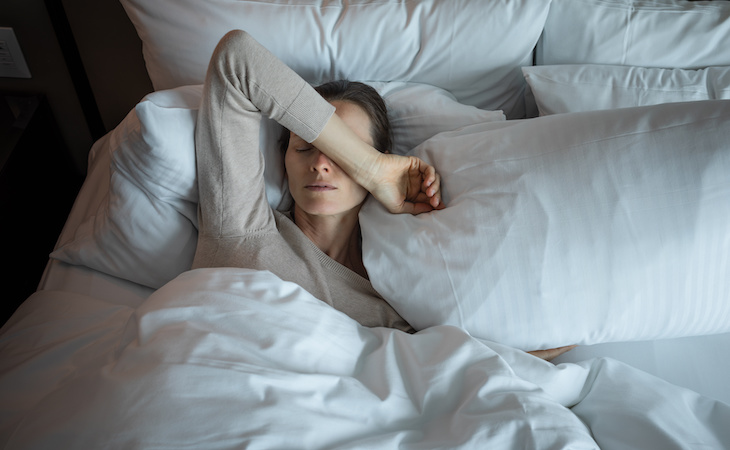By now, you’ve heard medical experts recommend adults get seven to nine hours of sleep per night, depending on a variety of factors including age. We all know people—maybe we’re one of them ourselves—who get less than the recommended amount of sleep.
But some people sleep more than the recommended amount of time for their age. They’re what’s known as a “long sleeper.” This article will explore what it means to be a long sleeper and how it can impact your health.
What is a long sleeper?
Long sleepers need more sleep than average adults—usually more than nine hours—to wake up feeling refreshed.
Both children and adults can be long sleepers, and in fact long sleeping may become a pattern beginning in childhood.
Long sleeping is different from the kind of oversleeping you may experience while ill or after temporary sleep deprivation.
Long sleepers need more sleep than average adults—usually more than nine hours—to wake up feeling refreshed.
Long sleepers usually wake up feeling refreshed. But when their work or social life prevents them from having the extended sleep period they need, they may experience excessive daytime sleepiness.
They may make up for getting less sleep on weeknights by sleeping for 12 hours or more on the weekend.
The recommended amount of sleep varies according to age:
Age Group Age Range Recommended Amount of Sleep Newborns 0-3 months old 14-17 hours of sleep Infants 4-11 months old 12-15 hours of sleep Toddlers 1-2 years old 11-14 hours of sleep Pre-schoolers 3-5 years old 10-13 hours of sleep School-aged kids 6-13 years old 9-11 hours of sleep Teenagers 14-17 years old 8-10 hours of sleep Young adults 18-25 years old 7-9 hours of sleep Adults 26-64 years old 7-9 hours of sleep Older adults 65+ years old 7-8 hours of sleep
Causes of long sleeping
Long sleeping has no clear cause. Some experts believe long sleepers simply need more sleep than others their age. There may be a genetic component to long sleeping.
While some health conditions can contribute to sleeping more than usual, that’s different from long sleeping. It’s considered long sleeping when there’s no known medical issue or underlying illness.
Further studies are needed to better understand why some people regularly sleep for more hours than most others.
Health implications of long sleeping
The effects of long sleeping on health are unclear. Studies have found a higher risk of some health problems in long sleepers, but it’s not clear whether long sleeping itself causes them.
Large studies have found long sleepers with an elevated risk of diabetes as well as cardiovascular problems, including heart disease and stroke.
Long sleepers are at greater risk for weight gain and even death compared to people who sleep seven to eight hours per night.
Monique May, MD, board-certified family physician and medical advisor at Aeroflow Sleep, says while long sleep is simply normal for some people who may not have any negative health consequences, for others “long sleep duration may signal an underlying issue or lead to negative outcomes.”
These can include chronic conditions—such as diabetes, cardiovascular disease, and even cognitive decline. “The reasons remain unclear but may reflect underlying health problems rather than sleep itself,” May says.
Besides chronic conditions, there can also be mental health impacts. “Long sleepers may face higher rates of depression and anxiety, although this could be a cause or consequence of their sleep patterns,” notes May.
There are lifestyle factors too. “Excessive sleep can sometimes lead to sedentary behavior, reducing physical activity and contributing to poor overall health,” says May.
Diagnosing long sleeping
May says being a long sleeper is typically diagnosed through a combination of medical evaluations, sleep assessments, and self-reported sleep patterns. The process follows these steps:
- Clinical sleep history: A health care provider or sleep specialist gathers detailed information about your sleep patterns and habits.
- Exclusion of underlying conditions: A diagnosis of long sleep syndrome (a rare condition, May says) requires ruling out other potential causes of excessive sleep, such as sleep disorders, mental health conditions, chronic conditions, or medications or substances that may cause drowsiness or prolonged sleep.
- Sleep logs or diaries to track sleep patterns for one or two weeks.
- Actigraphy: A wearable device monitors movement and provides objective data on sleep patterns and duration.
- Polysomnography (sleep study): This overnight test measures brain activity, heart rate, breathing, and other physiological factors during sleep to rule out conditions like sleep apnea or restless legs syndrome.
- Multiple Sleep Latency Test (MSLT): An MSLT is sometimes used to evaluate daytime sleepiness and determine how quickly someone falls asleep during the day. “This helps differentiate long sleep syndrome from conditions like narcolepsy,” May says.
How to deal with being a long sleeper
“Coping with being a long sleeper involves understanding your unique sleep needs and adapting your lifestyle to ensure balance and productivity while prioritizing health,” says May. She offers these strategies to help:
- Establish a consistent sleep schedule: Stick to regular bedtimes and wake-up times, even on weekends. Plan your schedule around your natural sleep needs, ensuring you allow for nine to 10 hours of rest without disruptions.
- Prioritize sleep hygiene: Follow a relaxing bedtime routine to prepare for sleep. Keep your room dark, cool, and quiet. Limit screen time and avoid stimulants in the evening.
- Optimize your daytime routine: Schedule work, social events, and exercise during your most alert and productive hours.
- Incorporate exercise: Regular physical activity can enhance energy levels and improve overall health.
- Communicate with others: Explain your sleep needs to friends, family, and coworkers to set realistic expectations and avoid misunderstandings. Advocate for flexible work hours, if possible, especially if you naturally sleep longer than the standard schedule allows.
- Evaluate sleep quality: Does your sleep feel restorative? If you’re sleeping long hours yet still feel fatigued, consult a health care provider to rule out potential underlying issues such as sleep apnea, depression, or chronic illness.
- Use alarms strategically: If you need to wake up earlier than you normally would, use gradual alarms or smart alarm clocks that monitor sleep cycles and wake you during lighter stages of sleep.
- Explore lifestyle adjustments: If extended sleep interferes with your daily responsibilities, consider experimenting with gradual reductions in your sleep duration, aiming to balance adequate rest and functionality.
- Seek professional guidance: Work with a sleep specialist if your long sleep is causing significant disruptions or challenges. They can offer tailored strategies or therapeutic interventions.
- Practice self-acceptance: Understand that being a long sleeper is often a normal variation and not necessarily a problem. Embrace your body’s natural rhythm and make adjustments that help you thrive.
It’s important to stress that you should see a doctor if at-home treatments don’t help.
FAQs
How do you know if you’re a long sleeper?
If you regularly need more than the recommended seven to nine hours of sleep per night to feel refreshed, and there are no underlying conditions causing you to sleep excessively, you’re very likely a long sleeper.
What’s a long sleeper vs. short sleeper?
Long sleepers typically sleep 10 to 12 hours (or more), while only four to six hours per night are the norm for short sleepers.
What’s the difference between a long sleeper and insomnia?
A long sleeper is someone who consistently sleeps much longer than most people, usually without any problems falling or staying asleep. Someone with insomnia has difficulty falling or staying asleep and often feels tired even after a long sleep time.
Can long sleeping be cured or managed?
There’s no cure for long sleeping, and thinking in terms of a cure may not fit something that’s natural for some people based on their own body’s rhythms and needs. But for long sleeping that’s problematic, there are indeed ways it can be managed as we’ve noted above. “By prioritizing sleep while making thoughtful lifestyle changes, long sleepers can maintain their health and meet the demands of daily life,” says May.
Is being a long sleeper unhealthy?
Studies find long sleepers are at heightened risk for various health conditions, including cardiovascular disease and diabetes. When excessive sleep interferes with work and social responsibilities, it can cause other problems beyond physical ones.
Next, learn what causes someone to be a light sleeper and how to manage it.




